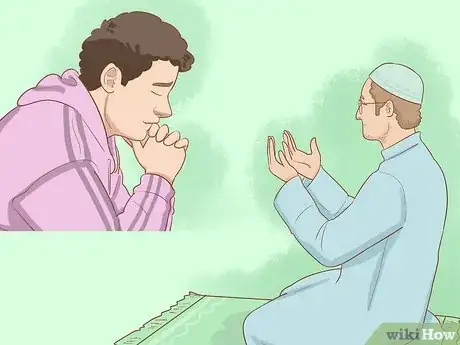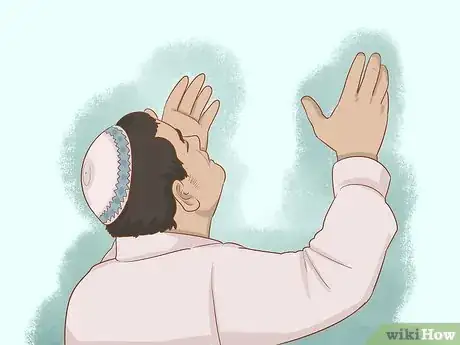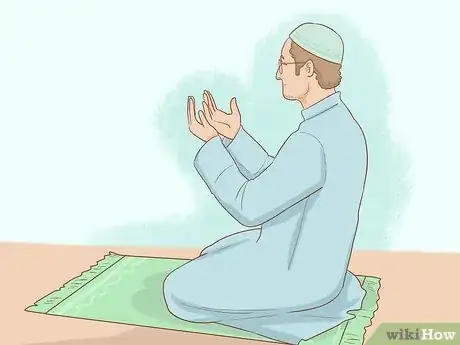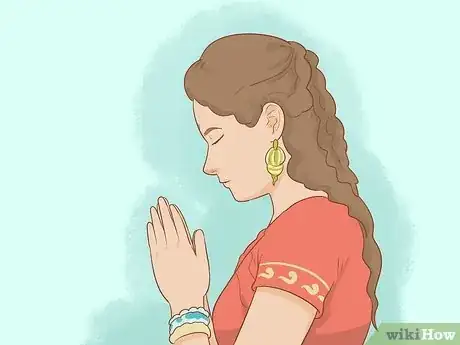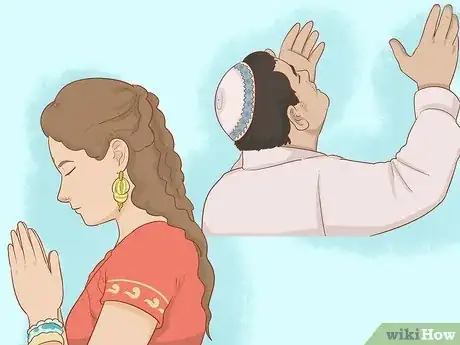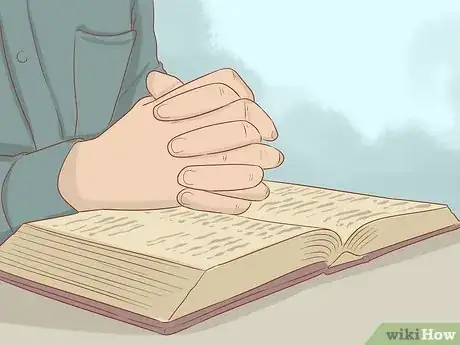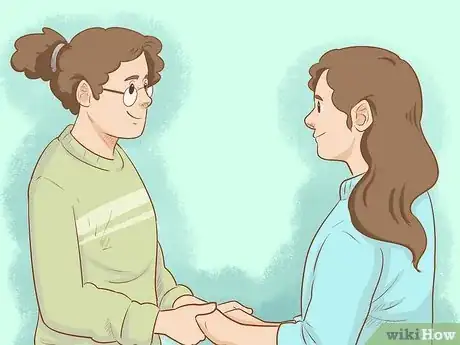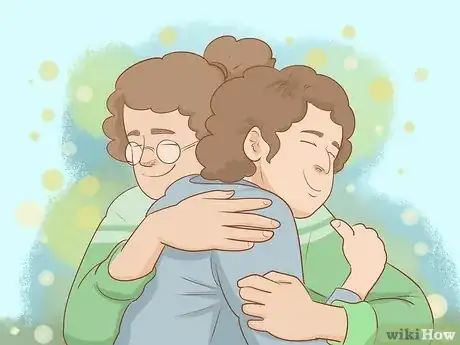This article was co-authored by Lia Huynh, LMFT and by wikiHow staff writer, Amy Bobinger. Lia Huynh is a Licensed Marriage & Family Therapist with over 20 years of experience. She specializes in providing counseling services for individuals, couples, Christians, and Asian Americans. Lia holds a BA in Psychology from The University of California, Los Angeles and an MS in Marriage and Family Therapy and Pupil Personnel Services from San Francisco State University.
There are 16 references cited in this article, which can be found at the bottom of the page.
This article has been viewed 13,370 times.
Sometimes when you lose someone close to you, it can be really hard to let them go. If you're a person of faith, you may find comfort by praying that you'll be reunited. No matter what higher power you believe in, we're here to help you pray for your lost love. Keep reading for everything you need to know about how to get back lost by prayer as well as tips on how to cope and heal from your loss.
Steps
How can prayer help you get back lost love?
-
1Prayer can help you find comfort and hope. Whether it's a Christian prayer, Hindu mantra, Islamic dua, or a prayer of your own creation, praying is an act of faith. You're reaching out to a higher power with your deepest need. Even the simplest prayer can offer comfort if you're struggling—as you release your concerns in prayer, you'll often find yourself feeling emotionally lighter.[1] X Trustworthy Source Association for Psychological Science Nonprofit organization devoted promoting trustworthy research and education in the psychological sciences Go to source
- Praying can also help you handle stress and negative emotions more easily, and it often helps you feel more connected to the god of your faith.
-
2That said, your prayers may be answered differently than you imagine. Unfortunately, there's no guarantee that if you pray for your lost love to return, it will happen exactly the way you want. Sometimes people's paths are only meant to cross once in this life. However, even if you don't get the answer you want, prayer may help you find the strength you need to cope with and move forward from your loss.[2] X Research source
Prayers for Lost Love
-
1Christianity: Petition God like you're talking to a friend: "Heavenly Father, I come before you today to humbly ask you to return my love to me. My heart is broken and I know you sent him to be my partner. Help him see what he's missing so he'll come home. Amen."
- "Dear Lord, please help me reunite with my love. Lead her home to me. In your name I pray. Amen."
-
2Judaism: Pour out your heart by saying something like, "I don't know what to do next. I met a woman I could be with forever, but she lives far away. I want to try to make it work with her, but she doesn't want a long-distance relationship. Please help me."
- "God, I come before you today asking you to bring my lost love back to me."
-
3Islam: Raise your hands, then say: "Al-'Afuww, you love to forgive, so forgive the unbelievers and forgive me. My unkind words caused so much pain to my sister that she will not speak to me. I ask that you soften her heart so that I can apologize and we can heal our relationship. Amin." When you are finished, wipe your hands over your face.[3] X Research source
- "Praise Allah. Al-Karim, you are most generous. I ask that you bless me with your generosity by sending my lost love back to me so we may be reunited. Amin."
-
4Hinduism: Repeat a mantra like "Om Namo Bhagavate Rudraya" ("I bow to Lord Shiva") while visualizing what you want.[4] X Research source
- "Om kameshwar [name of your love] aanaya vashna kleem II."
How do you pray for a lost love?
-
1Write a prayer that comes from your heart. Since prayer is typically considered the best way to communicate with God, think of this as your chance to ask for exactly what it is you want. Even if you base your prayer on an existing prayer, adjust the wording so it's specific to you. Not only will that help you understand your own need more clearly, but it will help you be better attuned to the answer to your prayer.[5] X Research source
- For instance, if you're asking dua, you might follow the traditional structure by first invoking Allah's name, then confessing your shortcomings and repenting for your sins, and finally asking Allah for help.
- If you do find a pre-written prayer, mantra, or dua that you feel suits your needs, it's okay to use it as-is, as long as you truly feel a connection to every word. If there's anything that doesn't fit your situation, it's ok to adjust the language.
-
2Acknowledge your sense of pain and loss. Losing someone you love is painful, and it's okay to express that in your prayer. In fact, prayers are often centered on a heartfelt expression of hurt, with the hope that God will ease that pain.
- For instance, you might pray something like, "God, only you know how heartbroken I've been since my sister went missing. I cry every night, and I feel like I'll never be the same until she's home safely."
- If you feel a sense of wrongdoing or guilt—like you argued with a loved one before they passed away or you feel responsible for the end of your relationship—include that in the prayer as well, and ask for forgiveness.
-
3Wish the best for your lost love. It's an act of love to pray for someone else. In Catholicism, for instance, praying for the living and the dead is considered one of the 7 Spiritual Works of Mercy.[6] X Research source Pray for the other person unconditionally—meaning that you should ask for their peace and well-being even if they're not reunited with you.
- You might pray for the person's good fortune, health, peace of mind, or even their afterlife if they've passed away.
-
4Pray about your wish to have the person back in your life. This is the core of what you're really asking for. Only you know what you're envisioning for the future with your lost love. Depending on your circumstances, you might pray for:
- Your former partner to realize they miss you and want to be reunited.
- Forgiveness from an estranged friend or family member
- A missing loved one to be located.
- A loved one to be at peace in the afterlife.
- Your heart to be healed after a painful loss.
Crafting Your Prayer
-
1Your prayer will depend on the type of love you've lost. Prayer is really personal, and you can lose someone in a lot of different ways. When you're praying, focus on the specific circumstances you're going through.
- For instance, if you've recently gone through a breakup, you might find comfort in praying that you'll get back together with your ex.
- If a close friend or family member has gone missing, you might pray that they'll return home.
- If you're mourning the death of a loved one, you may pray that you'll be able to feel spiritually connected to them.
-
2You'll also pray differently depending on your faith. Almost all of the major faiths believe that prayer is a way that a person can connect directly with a higher power. However, each faith has its own traditions around prayer. Structure your prayer in a way that feels authentic to what you believe.[7] X Research source
- For instance, if you're a Christian, you might address your prayer to Jesus. However, if you're a Catholic, you may prefer to pray to a saint, like Saint Anthony of Padua, patron saint of lost loves.[8] X Research source
- If you're Hindu, you might recite a mantra to call on the god or goddess of your choice.
- If you're Muslim, you might use a dua to call out to God and express your need for help.[9] X Research source
- If you're Jewish, you may devote your morning, afternoon, and evening prayers to asking God for your lost love back.[10] X Research source
-
3Pray alone or with others. You may gain additional peace by praying as part of a group. For one thing, you're reaching out to your religious community for support, and that social understanding can be a huge comfort.[11] X Research source However, some of the largest religions also recognize a spiritual aspect of praying together:
- In Islam, there's a passage in Sunan Abu-Dawud that says: "A man's prayer said along with another is purer than his prayer said alone, and his prayer with two men is purer than his prayer with one, but if there are more it is more pleasing to Allah, the Almighty, the Majestic." (Book 2, Number 0554)[12] X Research source
- Similarly, in the Christian Bible, Matthew 18:20 says, "For where two or three gather in my name, there am I with them." (NIV)
Coping with Your Loss
-
1Wait with an expectant heart. Once you've expressed your heart through prayer, you might feel that the only thing left to do is sit back and wait. However, there's not much faith involved in waiting passively for an answer. Instead, spend every day filled with hope and the expectation that your prayer will be answered, even if it doesn't look exactly how you imagined it would.[13] X Research source
-
2Keep praying while you wait. Just because you're waiting for an answer doesn't mean you should give up on prayer. In fact, you should pray as fervently as ever to maintain a strong connection to your God and faith. Remember, while your relationships with loved ones are an important part of your life, the God of your faith is always there for you when you pray.[14] X Research source
- Try reading the important texts of your faith to give you strength when you're feeling hurt and alone. For instance, you might read Jewish poems of comfort or prayers for healing, Hindu mantras for lost love, or Islamic duas.
-
3Focus on what you can do to improve your life. While prayer can be a really powerful source of comfort, that doesn't mean it should be the only step you take to start healing. What are some of the things that usually make you feel better when you're down? Diving into a new project or hobby might be just the thing you need.[15] X Research source
- Spending time in nature—like going for a hike, visiting a nature center, or having a picnic—is a great way to distract yourself, and it can also help you feel connected to a higher power.
- Exercise is always a good stress reliever, and caring for your body is a good way to honor the god of your faith. You may also benefit from a meditation or yoga practice.
- Taking religious classes can help you become more familiar with your faith while giving you a chance to fellowship with like-minded believers.
-
4Spend time with supportive loved ones. When you're mourning a lost love, you may sometimes feel isolated in your grief. However, there are almost always people who are willing to support you. If you have family and friends you can turn to, let them know you're struggling and could use someone to talk to.
- You could also reach out to someone in your faith, like a mentor or spiritual leader.
Healing from Your Loss
-
1Take some time to process and heal from your loss. If your lost love does not come back to you, trust in your higher power that it was not meant to be. Even if this is painful, however, you still owe it to yourself, your loved ones, and your faith to live the best life you can. Here are a few tips for healing from grief:[16] X Trustworthy Source HelpGuide Nonprofit organization dedicated to providing free, evidence-based mental health and wellness resources. Go to source
- Allow yourself to experience your emotions as they come up, without judging yourself. If you're sad, be sad. If you're angry, be angry. If you try to bury your feelings, it will only be harder to heal in the long term.
- Take as much time as you need. Regardless of the nature of your loss, there's no set timetable for healing. Even when you've mostly moved on, you may still occasionally experience feelings of sadness.
- Make it a priority to care for yourself by eating nutritious meals, making time for physical activity, spending time with people who love you, and getting involved in activities you enjoy.
-
2Don't lose faith if the answer was no. Your loved one may not return to you, but that doesn't mean your prayer wasn't heard. It just means the answer is different from what you'd hoped because this person isn't meant to be a part of your journey any more.
- Verse 2:216 in the Qu'ran beautifully describes why you may not get the exact answer you seek from prayer: "Perhaps you hate something and it's good for you, and perhaps you love something and it's bad for you. Allah knows, while you don't know."[17] X Research source
- The answer may also sometimes be, "Not yet." However, don't put your life on hold waiting for the other person. Get back out there and live your best life—if they're meant to return to you in time, they will.
-
3Focus on the people who are still in your life. Once you've turned your loss over to a higher power, turn your attention to the family and friend relationships that you still have. Embrace new relationships as well—you may find that the universe has a new love in store for you, as long as you're open to it.
You Might Also Like
 How to Pray Janazah
How to Pray Janazah



 How, When, and Why to Pray a Novena
How, When, and Why to Pray a Novena





 How to Pray the Seven Sorrows
How to Pray the Seven Sorrows



References
- ↑ https://www.psychologicalscience.org/news/the-science-of-prayer-2.html
- ↑ https://www.bibleinfo.com/en/questions/why-does-god-not-answer-my-prayer
- ↑ https://muslimhands.org.uk/latest/2021/04/how-to-make-dua-according-to-quran-and-hadith
- ↑ https://timesofindia.indiatimes.com/religion/hindu-mythology/6-mantras-of-lord-shiva-that-are-powerful-enough-to-solve-all-your-problems/articleshow/70427560.cms
- ↑ https://www.guideposts.org/prayer/how-to-pray/5-great-reasons-to-pray-specifically
- ↑ https://www.hscc.us/uploads/docs/WorksOfMercy.pdf
- ↑ https://www.latimes.com/archives/la-xpm-2000-nov-18-me-53924-story.html
- ↑ https://www.catholic.org/saints/saint.php?saint_id=24
- ↑ https://www.islamreligion.com/articles/4005/dua-supplication-part-1/
- ↑ https://www.bbc.co.uk/religion/religions/judaism/worship/prayer_1.shtml
- ↑ https://www.methodist.org.uk/media/5031/dd-explore-devotion-sevenbenefitsofprayingtogether-0912.pdf
- ↑ https://muslim.sg/articles/5-benefits-of-congregational-prayers-in-islam
- ↑ https://openthebible.org/article/what-to-do-while-youre-waiting-on-god/
- ↑ https://productivemuslim.com/mend-broken-heart/
- ↑ https://productivemuslim.com/mend-broken-heart/
- ↑ https://www.helpguide.org/articles/grief/coping-with-grief-and-loss.htm
- ↑ https://www.patheos.com/blogs/mostlymuslim/2017/10/ayahs-verses-quran-comfort-broken-heart/
About This Article

